IN ENGLISH
The Age of Skin
(Open Letter Books 2020)
My copy of Dubravka Ugresic’s ‘The Age of Skin’ is highlighted, underlined, and peppered throughout with asterisks, exclamation marks, and messy notes. Why? Because Ugresic might just be one of the best essayists on the planet; her praises are sung by the likes of Susan Sontag, Joseph Brodsky, and Charles Simic … In meticulously documenting and cataloging modern life, her essays are like packed storage units, stuffed to the gills with the artifacts of arts and culture. Like a museum tour guide, she leads us through the bleak detritus, capitalist’s junk, and beautiful polished antiques of lost eras, forging a path through her material in a way that readers can comprehend. To the left, we see a flag from a war-torn nation, to the right, we see refugees bonding over baklava. J.P. Poole, Malvern Books
A major literary voice in Europe, Ugresic brings deep personal insight into the grinding despair and destructive nationalism of post-communist societies, often writing with lively, ironic flair keenly translated by Elias-Bursac. Do Lenin’s mummy, Adele and Croatian unemployment have any business being in the same essay together? In this book, yes. Gladly.– The New York Times.
Dubravka Ugrešic´ is an incisive voice in our chaotic world. In a new collection of essays (…) The Age of Skin Ugrešic´ guides us through the swampy maelstrom of popular culture, offering a sharp, witty critique of our present reality. — Tank Magazine.
There are few writers observant, so wry, and, I’m grateful to say, so prolific as Dubravka Ugresic (…) this book has been a favorite way to tuck myself in at night during some uncertain times. – Jeff Waxman, LitHub.
Ugresic is brilliant — and frightening — in the way she charts the rise of nationalism and neo-fascism/…/Ugresic is a darkly funny writer. She’s the perfect companion in the quest to understand our world more fully. Book Riot.
American fictionary
(Open Letter Books 2018; second, revised edition; first edition Have A Nice Day: From the Balkan Ear to the American Dream, Jonathan Cape 1994; Viking Penguin 1995)
As in all of her writing, Ugresic is wickedly smart and funny but often heartbreaking too, leading readers through her reflections on exile, immigration, and American consumerism―reflections that speak directly to the state of the world today. — BookRiot, June 2019.
(Ugresic) has a way of freely navigating themes and registers—she can swing effortlessly between comic vignettes and musings on American kitsch to deeper, essayistic pieces on melancholy, exile, and the loss of her homeland. First published in English almost 25 years ago as Have a Nice Day: From the Balkan War to the American Dream, the collection has been tweaked and updated, with a new epilogue that adds poignant perspective to both the dissolution of her country and the increasing threats to our own. — Vanity Fair
Fox
(Open Letter Books 2018; TANK 2021)
Is there a better avatar for the storyteller than the fox, that sly and duplicitous creature who haunts the margins (and roots around through our trash)? This figure flits through Ugrešić’s novel, illuminating the origins and destinies of stories—which in Fox range from considerations on Nabokov, Russian literature, and the fragmentation of Eastern Europe as experienced by women. Written in her typically funny, touching, and layered prose, Fox proves beyond a doubt that Ugrešić is one of the most incisive and talented of our contemporary novelists. – Stephen Sparks, LitHub
Ugrešić’s work spans styles and genres, and some of her most memorable writing comes when she is offering up unexpected observations or jarring cultural juxtapositions (…)The result is heady and frequently compelling. – Tobias Carrol, World Without Borders
A bracing intellectual conversation for sophisticates. – Library Journal
Brilliant and laugh-out-loud funny. – Kirkus Review
(…) rare and inimitable author. – The Wall Street Journal
Ugresic stretches novelistic conventions and boldly interrogates the purpose of literature heading into 21st. century. – Annie Metcalf
Like its totem animal, Fox is vigorous, playful, euphoric, elusive, and virtuosic. In an epilogue, Ugrešić quotes a line from Pasolini’s Decameron: “Why create art when dreaming about it is so much sweeter?” In that sense, Fox is her sweetest work yet, as it is achieved not by writing a story, but by dreaming one. — Hannah Weber, The Calvert Journal
Europe in Sepia
(Open Letter Books 2014)
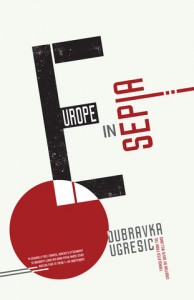 In her previous essay collection, “Karaoke Culture,” which was a finalist for a 2011 National Book Critics Circle Award, Ugrešić counted herself as a member of the “dubious guild” of critics who are “prepared to see more” behind our cultural enthusiasms than mere passing fads. (…) The essays are loosely united around the theme of nostalgia—the “unnerving premonition that the world” is “about to suddenly vanish”—but they delve into history, politics, entertainment, and sometimes take off into personal flights of fancy. Ugrešić’s writing is lithe and passionate, but maintains a strangeness and humor that make it endlessly intriguing. — The New Yorker
In her previous essay collection, “Karaoke Culture,” which was a finalist for a 2011 National Book Critics Circle Award, Ugrešić counted herself as a member of the “dubious guild” of critics who are “prepared to see more” behind our cultural enthusiasms than mere passing fads. (…) The essays are loosely united around the theme of nostalgia—the “unnerving premonition that the world” is “about to suddenly vanish”—but they delve into history, politics, entertainment, and sometimes take off into personal flights of fancy. Ugrešić’s writing is lithe and passionate, but maintains a strangeness and humor that make it endlessly intriguing. — The New Yorker
Ugrešić’s writing is unified by her sharp wit, cunning mind, absurdist sensibility, and its fragmentation. (…) Ugrešić’s essays are just as fragmented, with her mind racing the hyperkinectic speed of her travels, it seems.— The Millions
Yet these acerbic, angry essays lay bare what shapes our world and ourselves: envy, greed, and the forces they unleash—anarchy and revolution. And as Ugresic states, “What was once a satire on a possible reality has today become reality.” So, finally, her scalpel cuts too deep for laughter.— World Literature Today
“Dubravka Ugresic, by her own definition a ‘post-Croatian’ writer, is our present-day Kafka. In her excellent new book of essays, ‘Europe in Sepia’, she invokes the comedy and melancholy of being a writer in a world without ideology or ideals”. — Amit Chaudhuri
Karaoke Culture
(Open Letter Books 2011)
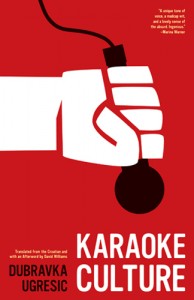 Ugresic never commits a sloppy thought or a turgid sentence. Under her gaze, the tiredest topics of the “tired” continent (migration, multiculturalism, “new Europe”) spring to life.
—The Independent
Ugresic never commits a sloppy thought or a turgid sentence. Under her gaze, the tiredest topics of the “tired” continent (migration, multiculturalism, “new Europe”) spring to life.
—The Independent
Ugresic, (…) is one of the most stringent and wide-ranging commentators at work today, bringing an ironic sensibility honed under communism to global pop culture. In the pieces collected here (…) she sounds like the fantasy cultural-studies professor you never had, making crazy connections between unlikely ideas that turn out to be brilliant.. — The New Republic
Ugresic writes in short, episodic sections, making surprising leaps. An essay that begins with a Hemingway look-alike contest hops quickly to the arrest of Serbian war criminal Radovan Karadzic. The connections are electric: It’s an intellect in action, ideas zapping across the page.(…) “Karaoke Culture” is an essential investigation of our times.— Los Angeles Times
(Ugresic) remains one of the funniest, shrewdest, most uplifting writers that Europe can boast. Her new collection of essays, Karaoke Culture ought to find its way onto the desk of every pundit and politician who rushes to pass judgment on the ex-Yugoslav inferno. With its deadpan humour just this side of heartbreak, the 50 pages of “A Question of Perspective”, which recounts her heresies, persecution and flight from the madness of Croatian nationalism – counts as a classic testimony of our times. — The Independent
The essays are humorous, poignant, angry, insightful and always well written. Read them, then go and read her other collections, The Culture of Lies, Nobody’s Home and Thank You for Not Reading – and see if you ever look at the world in the same way again.— Irish Times
Baba Yaga Laid An Egg
(Canongate 2009; Grove Press 2010)
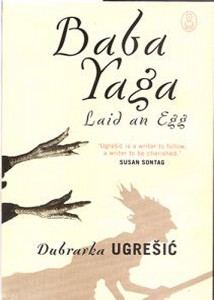 Ugresic’s retelling may be blisteringly postmodern in its execution but at its heart is a human warmth and even a silliness that infuses it with the sweet magic of storytelling. — The Times
Ugresic’s retelling may be blisteringly postmodern in its execution but at its heart is a human warmth and even a silliness that infuses it with the sweet magic of storytelling. — The Times
Baba Yaga Laid an Egg by Dubravka Ugrešić is on the simplest level about the adventures of four old hags, plus their families and friends, adventures seen through the palimpsest narration of ur-witch Baba Yaga—the greatest hag of ’em all. I don’t use the word hag impudently here. The author not only invites the term; in this strange and wonderful book, she owns it. — Mary Gaitskill
Baba’s story is made up of three parts: a writer dealing with an ailing, removed mother, a group of women at a longevity and health spa, and an academic folklorist’s interpretation of the previous stories. This is no dull academic exercise—Ugresic’s style is eminently readable, and the novel is as ambitious as it is rewarding. — Library Journal
Dubravka Ugresic is a whistler in the dark, a thinker and storyteller with one foot in the absurd, another in surreal, and the third foot… elsewhere, just elsewhere (…) Ugresic meets Yaga and takes the reader on a glorious romp that doubles as confrontation of the values we attribute to youth and aging — Helen Oyeyemi
Ugresic has created a wise, sharp fairy tale of her own. And like one of those mythic stories, it’s slow to reveal its secrets. Every element has hidden meaning, and repeat readings are rewarded. The three parts, each one substantial on its own, feed in to one another to create something majestic. It’s a work worthy of any crone. And I mean that as a compliment.—Jessa Crispin
Nobody’s Home
(Telegram/Saqi 2007; Open Letter Books 2008)
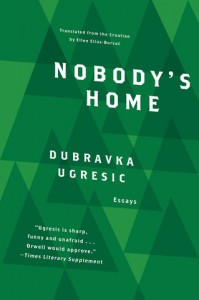
This book is part memoir, part shrewd observation, part travel writing at its best. Each section opens with a loving quotation from the Russian satirists Ilf and Petrov, and Ugresic writes with something of their impish genius. —Telegraph
Dubravka Ugresic is Walter Benjamin’s Baudelaire, the poetic sojourner who finds himself at the whim of the crowd. She is the flaneur cast into the streets, nowhere at home. And like Baudelaire, Ugresic is a writer in full view of and at odds with the forces of commodity culture, a writer whose mission is to give form to modernity. But if Baudelaire’s poetry is permeated by melancholic doom, Ugresic’s diagnosis of life’s illusory qualities is delightfully judgmental and cheerily pessimistic. Or as she tartly concludes in Nobody’s Home, her new collection of essays, “this book breaks the rules of good behavior, because it bickers.”– Nicole Rudnick
The Ministry of Pain
(Saqi 2005; Ecco Press 2006)
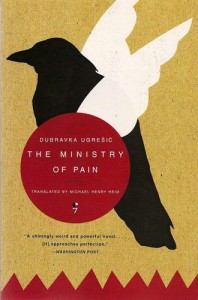 Dubravka Ugresic’s novel — if you care about language and how it fails and sometimes succeeds at defining the human condition — approaches perfection. The translation, the handling of dialects and nuances of what is essentially the same language in five or six different versions, is masterly. “The Ministry of Pain” will put the fear of God — or more likely man — into you. –The Washington Post
Dubravka Ugresic’s novel — if you care about language and how it fails and sometimes succeeds at defining the human condition — approaches perfection. The translation, the handling of dialects and nuances of what is essentially the same language in five or six different versions, is masterly. “The Ministry of Pain” will put the fear of God — or more likely man — into you. –The Washington Post
This edgy, extraordinary novel … vividly exposes the isolation, fear and confusion of enforced exile.’ — The Sunday Times
A profound and beautiful meditation on lost homes and territories, on the broken syntax of memory, on the self-inventions of rehabilitated refugees and on the capability to return and find what we left behind. — The Independent
A brave, accomplished, cultured novel, sombre and witty … This is Ugresic at her best … There are very pure pleasures in Ugresic’s honesty, her lightsome, moving prose — The Guardian
Her short, trenchant metaphors, her particular use of verse, fable, story, nightmares and dreams, neatly conjure up and fix the images of displacement … Ugresic’s poignant and uncomfortable metaphors stay long in the mind. — Literary Review
A disturbing read that should have you in its thrall. — The Times
[Ugresic] has produced a novel of insights and shocks for those of us who have not endured either. It is one that is both profound and brilliantly illuminated by a very humane clarity. — Daily Telegraph
The Ministry of Pain is a novel of questions … its indeterminacy, its refusal to accept absolutes, is one of its strengths — Times Literary Supplement
Lend Me Your Character
(Dalkey Archive Press 2004, second, revised edition; first edition: In the Jaws of Life, Virago Press 1992)
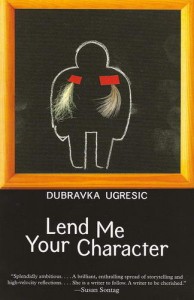 Ugresic must be numbered among what Jacques Maritain called the dreamers of the true; she draws us into the dream.” —The New York Times
Ugresic must be numbered among what Jacques Maritain called the dreamers of the true; she draws us into the dream.” —The New York Times
Ugresic’s wit is bound by no preconceived purposes, and once the story takes off, a wild freedom of association and adventurous discernment is set in motion. Open to the absurdity of all pretensions of rationality, Ugresic dissects the social world, especially the endless nuances of gender and sexuality.” —World Literature Today
Readers of Borges will nod knowingly, fans of Alfred Jarry will recognize an accomplice. The archeologists of Yugoslaviana will not leave empty-handed, either. Feminists will feel at home. Everybody will laugh reading Hot Dog in a Warm Bun, the story in which all things phallic get, well, slightly unhinged — but those interested in psychoanalysis will have a field day. (…) A good read is precisely this extended travel through texts other than the one read, and Lend Me Your Character asserts this as our right. This is arguably the best book by Dubravka Ugresic available in English, and it deserves the type of praise that Ugresic is usually uneasy about: sexy, hip, funny. —The Globe and Mail
Thank You For Not Reading
(Dalkey Archive Press 2003; Open Letter Books 2022)
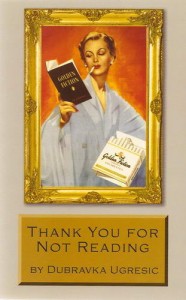 This intellectual spat with herself has produced a fast-moving, brilliant compendium of reflections and polemics about contemporary literary culture; a book to be compared with, perhaps preferred to, Neil Postman’s Amusing Ourselves to Death. — The Guardian
This intellectual spat with herself has produced a fast-moving, brilliant compendium of reflections and polemics about contemporary literary culture; a book to be compared with, perhaps preferred to, Neil Postman’s Amusing Ourselves to Death. — The Guardian
As long as some, like Ugresic, who can write well, do, there will be hope for literature. – Tess Lewis
We may take it for granted that someone such as Jackie Collins makes more than John Updike does. Ugresic doesn’t — and the freshness of her outrage, peppered with her acerbic wit, is the salient virtue of “Thank You for Not Reading.” — Los Angeles Times
She is also, unlike most higher-profile literary commentators, blessed with an ample supply of sly and self-deprecating wit. — The Washington Post
Dubravka Ugresic, whose name deserves to be more widely known, is not only a gifted Yugoslav novelist, author of The Museum of Unconditional Surrender (…) she is also an assured polemicist whose lucid commentary on the international, especially American, world of books is savage, quotable and perceptive. —The Observer
Ugresic is a demanding writer — highly literate, complex, self-consciously postmodern — but she is also brisk and funny, and a keen observer of the various cultures she has encountered in her peripatetic life since the beginning of the Balkan wars. (…)Anyone interested in good writing should disregard the title of this book and read Thank You for Not Reading. — The Globe and Mail
The Museum of Unconditional Surrender
(Weidenfeld&Nicolson 1998; New Directions 1999)
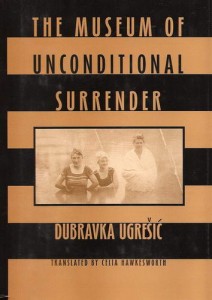 [A] brilliant, enthralling spread of story-telling and high-velocity reflections….She is a writer to follow. A writer to be cherished. — Susan Sontag
[A] brilliant, enthralling spread of story-telling and high-velocity reflections….She is a writer to follow. A writer to be cherished. — Susan Sontag
An epiphany of literature conditioned and shaped by social interaction and emancipatory in its responses. — Context
Like Nabokov, Ugresic affirms our ability to remember as a source for saving our moral and compassionate identity. — Washington Post
Ugresic pries deeply into the lives of her subjects…to make this muralistic work all the more affecting. — Publishers Weekly
The book is a collection of collections, a tour of exhibits and tiny personal museums such as her mother’s handbag from 1946, or a box of jumbled photographs: “We are the children of Bouvard and Pécuchet,” comments a colleague. Each collection is a fragile system erected against an overwhelming feeling of disorientation and loss. (…) Ugresic steps through the wreckage of war, picking up objects, searching for metaphors, attempting to lend narrative coherence the chaos she experienced first hand. — ArtMargins
Ugrešić’s book is one of the most unusual and original novels I have ever come across (…) — Richard Skinner.
The Culture of Lies
(Weidenfeld and Nicolson 1996; The Penn State Universityy Press 1998)
The Culture of Lies can be placed in the company of such landmark chronicle of dissent as Czeslaw Milosz’s The Captive Mind and Vaclav Havel’s Living in Truth — Literary Review.
Her vivid, impassioned, highly intelligent essays were acts of real courage for she had and has all the right moral and political sympathies… — Susan Sontag.
Ugresic is sharp, funny and unafraid in the face of the little dictators who have torn apart her former country. Orwell would approve. – Timothy Garton Ash.
The Culture of Lies is really a collection of observations, many of them focused on the official abuse of language: the ghost in the background is Karl Kraus. What Kraus did for Austria and Germany in the pre-Nazi period, Ugresic does for Croatia in the Tudjman period, with the Bosnia of Milosevic looming in the wings; and she does it at least as well. — Clive James
Have A Nice Day: From the Balkan War to the American Dream
(Jonathan Cape 1994;Viking Penguin 1995)
For decades, to be a Yugoslav writer was to turn up at the literary events in the West and have people struggle to place you. Nowadays they place you all too specifically and for a writer, that is perhaps worse. Are you Serbian, Croatian, Bosnian? The question is put hesitantly, as if inquiring into the nature of an illness; and the answer is routed to the corresponding slot under the headlines. What does this have to do with the pith of your style, your use of myth, your tutelary shades of Robert Musil, Italo Calvino or William Falukner? So for Dubravka Ugresic, a Croatian adrift in Western Europe and the United States, it was almost a pleasure when a shop assistant asked while spelling out her name:”Is it with those little guys above the letters?“At last, a literary question. — Richard Eder
Have A Nice Day is an unusual book, intimate and modern at the same time, and Ugresic has unique tone of voice, unfailing in its wit and sceptical intelligence, deceptively casual in the bravery of its truth-telling: listening to her brings one shock of recognition after another. — Marina Warner
Ms.Ugresic is an acutely perceptive observer of our culture’s mundane follies, and its pervasive myths. Have a Nice Day is a provocatively serious book about personal uprooting and the larger dislocations of our contemporary world.– Eva Hoffman
In the Jaws of Life and Other Stories
(“In the Jaws of Life”, London: Virago Press l992; “In the Jaws of Life and Other Stories”: Northwestern University Press 1993)
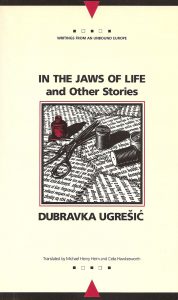 The title novel, “Steffie Speck in the Jaws of Life”, charts the life of a typist for lonely hearts column. Laid out like a sewing pattern, with instructions, diagrams, and helpful hints in the margin, it juxtaposes the cliches and trite advice of stereotypical women’s magazines and popular culture with the genuine despair of the marginalized heroine (…) Ugrešić is fresh, entertaining and consistently surprising.
The title novel, “Steffie Speck in the Jaws of Life”, charts the life of a typist for lonely hearts column. Laid out like a sewing pattern, with instructions, diagrams, and helpful hints in the margin, it juxtaposes the cliches and trite advice of stereotypical women’s magazines and popular culture with the genuine despair of the marginalized heroine (…) Ugrešić is fresh, entertaining and consistently surprising.
“An inventive collection, both vivacious and menacing…Ugrešić never misses a stitch, and her needle draws blood” — The Observer
Fording the Stream of Consciousness
(Virago Press 1991; Northwestern University Press 1993)
A madcap wit and a lively sense of the absurd . . . Filled with ingenious invention and surreal incident. — Marina Warner
Glazed with wit and slyness Fording the Stream of Consciousness has that airy and elusive quality, charm. It is bouncy, chaotic and boisterously post-modern. But unlike many exercises in post-modernity(…)Ugresic’s book is disciplined and strenuously concerned with real world. – Vanity Fair
Don’t squander time. Get hold of Ms Ugresic’s marvellous comic novel and squat in a private, soundproofed spot where you can triple up with laughter. Those with bittersweet tooth for fiction will find it meltingly irresistible. Ugresic writes as if pouring chocolate over nuts. She tempts you to bite till you taste the crunch. Then she bites you back — Scotland on Sunday

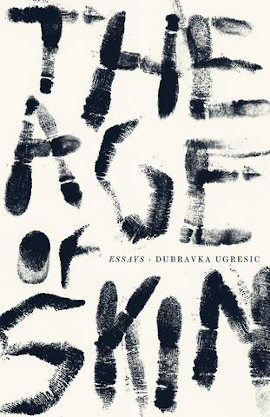
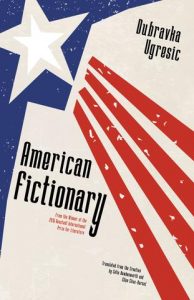
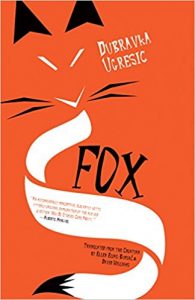
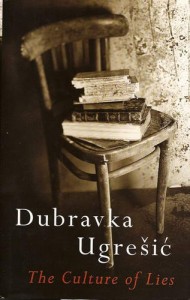
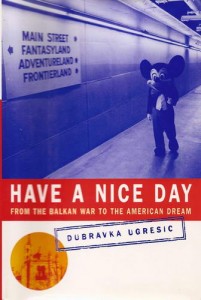
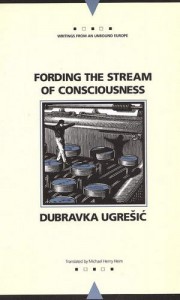 ———–
———–